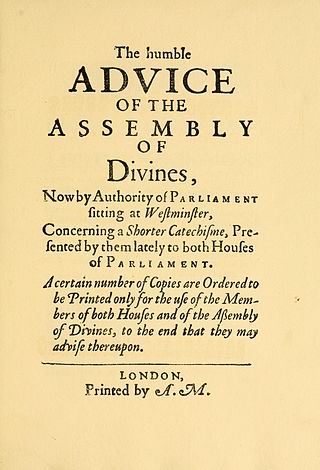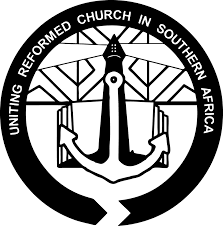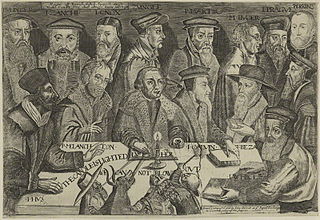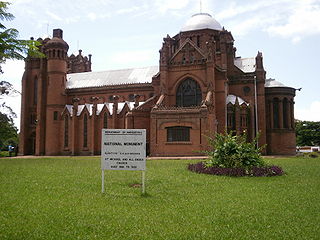Related Research Articles
The Protestant Church in the Netherlands is the largest Protestant denomination in the Netherlands, being both Calvinist and Lutheran.

Continental Reformed Protestantism is a part of the Calvinist tradition within Protestantism that traces its origin in the European continent. Prominent subgroups are the Dutch Reformed, the Swiss Reformed, the French Reformed (Huguenots), the Hungarian Reformed, and the Waldensian Church in Italy.

The Reformed Church in America (RCA) is a mainline Reformed Protestant denomination in Canada and the United States. It has about 104,921 members. From its beginning in 1628 until 1819, it was the North American branch of the Dutch Reformed Church.

The Heidelberg Catechism (1563), one of the Three Forms of Unity, is a Protestant confessional document taking the form of a series of questions and answers, for use in teaching Calvinist Christian doctrine. It was published in 1563 in Heidelberg, Germany. Its original title translates to Catechism, or Christian Instruction, according to the Usages of the Churches and Schools of the Electoral Palatinate. Commissioned by the prince-elector of the Electoral Palatinate, it is sometimes referred to as the "Palatinate Catechism." It has been translated into many languages and is regarded as one of the most influential of the Reformed catechisms.

The Westminster Shorter Catechism is a catechism written in 1646 and 1647 by the Westminster Assembly, a synod of English and Scottish theologians and laymen intended to bring the Church of England into greater conformity with the Church of Scotland. The assembly also produced the Westminster Confession of Faith and the Westminster Larger Catechism. A version without Scripture citations was completed on 25 November 1647 and presented to the Long Parliament, and Scripture citations were added on 14 April 1649.
The Dutch Reformed Church was the largest Christian denomination in the Netherlands from the onset of the Protestant Reformation in the 16th century until 1930. It was the original denomination of the Dutch Royal Family and the foremost Protestant denomination until 2004. It was the larger of the two major Reformed denominations, after the Reformed Churches in the Netherlands was founded in 1892. It spread to the United States, South Africa, Indonesia, Sri Lanka, Brazil, and various other world regions through Dutch colonization. Allegiance to the Dutch Reformed Church was a common feature among Dutch immigrant communities around the world and became a crucial part of Afrikaner nationalism in South Africa.

The Reformed Church in the United States (RCUS) is a Protestant Christian denomination in the United States. The present RCUS is a conservative, Calvinist denomination. It affirms the principles of the Reformation: Sola scriptura, Solus Christus, Sola gratia, Sola fide, and Soli Deo gloria. The RCUS has membership concentrated in the Midwest and California.

Calvinist confessions of faith are the confessions of faith of various Calvinist churches. These documents express consensus on doctrine for the church adopting the confession. A few confessions are shared as subordinate standards by many denominations, which have made their choices from among the various creeds for primarily historical reasons. Some of the common Calvinist confessions are :
The Belhar Confession is a Christian statement of belief written in Afrikaans in 1982. It was adopted as a confession of faith by the Dutch Reformed Mission Church (DRMC) in South Africa in 1986

The Uniting Reformed Church in Southern Africa was formed by the union of the black and coloured Nederduits Gereformeerde Kerk mission churches.
The North American Presbyterian and Reformed Council (NAPARC) is an association of several Presbyterian and Reformed churches in the United States and Canada. The Council meets annually.
The Three Forms of Unity is a collective name for the Belgic Confession, the Canons of Dort, and the Heidelberg Catechism, which reflect the doctrinal concerns of continental Calvinism and are accepted as official statements of doctrine by many Calvinist churches.

Calvinism originated with the Reformation in Switzerland when Huldrych Zwingli began preaching what would become the first form of the Reformed doctrine in Zürich in 1519.
The Church of Christ in the Sudan Among the Tiv is a confessional Christian Reformed denomination in Nigeria.

The Reformed Churches in South Africa is a Christian denomination in South Africa that was formed in 1859 in Rustenburg. Members of the church are sometimes referred to as Doppers.

The Church of Central Africa Presbyterian (CCAP) is a Presbyterian denomination. It consists of five synods: one in Zambia, one in Zimbabwe and three in Malawi – Livingstonia Synod in the north of the country, Nkhoma Synod in the centre, and Blantyre Synod in the south.
The Calvin Synod is an acting conference of the United Church of Christ, composed entirely of Reformed, or Calvinist congregations of Hungarian descent. Unlike much of the UCC, the Synod is strongly conservative on doctrinal and social matters, and many members of the "Faithful and Welcoming Movement," a renewal group acting to move the UCC in a more orthodox direction, belong to this body.

The Dutch Reformed Church in Namibia is a Christian denomination in Namibia. It is one of ten synods of the Dutch Reformed Church in South Africa (NGK), and the only one outside South Africa. It covers all of Namibia except for the Eastern Caprivi Strip.
The Reformed Churches (Restored) (Dutch: Gereformeerde Kerken in Nederland (hersteld)), also known as the New Reformed Churches (Dutch: Nieuwe Vrijgemaakte Kerken) constitute a Christian denomination in the Netherlands. It separated from the Reformed Churches in the Netherlands (Liberated) in 2003. Officially named the "Reformed Churches in the Netherlands", they are usually called the "Reformed Churches (Restored)" to avoid confusion with the Reformed Churches in the Netherlands (Liberated) and the Reformed Churches in the Netherlands (GKN).
The Synod Central Africa is a regional governing body in the Dutch Reformed Church in South Africa in Zimbabwe. In 1895 3 congregations were established in what was then known as Rhodesia. The number of congregations increased rapidly, theses was part of the Cape Synod, later the Free State Synod and the Transvaal Synod. Finally the Dutch Reformed Church - Synod Central Africa become autonomous in 1957. It has 16 congregations, 41 house fellowships and 2,600 members. Official languages are English and Afrikaans. The Apostles Creed, Athanasian Creed, Canons of Dort, Heidelberg Catechism, Belgic Confession is generally accepted standards.